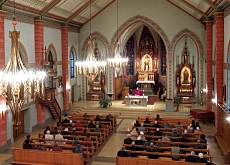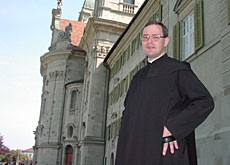Church experiences clash of cultures

One of the challenges facing the new Pope, Benedict XVI, is how to deal with the acute shortage of priests in the Catholic Church of western Europe.
In Switzerland the church has had to resort to hiring clergy from abroad. In an interview with swissinfo, deacon Franz-Xaver Herger of the diocese of Chur says the integration of foreign priests has not been easy and not all parishes are willing to accept them.
Herger was given the task last year of starting up an introductory course for priests and theologians from abroad.
The goal is for the participants to better understand the structure of the Chur bishopric – the second largest in the country – the Swiss state and society in general.
He says that foreigners are introduced to the “dual system of how the church is run internally and how it fits into the authorised church structure” and made aware of the ecumenical situation and Switzerland’s Protestant church system.
He says efforts are also made “to clarify their linguistic and cultural suitability” for their future posts.
swissinfo: How dependent is Switzerland’s Roman Catholic Church on foreign priests?
Franz-Xaver Herger: We are dependent on priests and theologians from abroad. Otherwise, we would not be able to provide pastoral care. In canton Zurich, there are more than 50 foreign pastoral assistants working for the church, mostly from Germany, and there are many parishes led by foreign priests.
They have enriched our diocese. We value the cultural exchange, the new relationships and contacts we’ve made. It’s obvious that cohabitation is not always easy, but we’re convinced that the introductory course provides a real service.
swissinfo: How are the priests recruited and from which countries do they come?
F-X.H.: They come from many different nations: Nigeria, Congo, India and Indonesia to name but a few. We receive a lot of requests from African and Indian bishops who would like to send priests to Switzerland. That’s because on the one hand they have a lot of priests at their disposal and on the other the priests who come to Switzerland provide financial assistance for their bishops and seminaries back home.
swissinfo: What are the main obstacles to successfully integrating a foreign priest?
F-X.H.: It’s very important to mention language barriers. If one doesn’t have command of a language than it’s difficult to provide spiritual guidance. Language plays an essential role in the liturgy as well.
Much of our democratic sense and way of thinking is also strange to them. Especially clergy from non-Swiss dioceses are used to carrying out orders [from the bishop] or giving them. This is where different mentalities collide.
The legal basis of our authorised church is for many incomprehensible. In their countries the bishop, who also controls the purse strings, has the last word, which isn’t the case here. Swiss church communities have a lot of influence, particularly over finances.
Those that come from developing countries are used to restricting their work to administering the sacrament and celebrating the church service. Here, priests have to take responsibility for many organisational tasks as well. This is difficult for a lot of clergy from abroad to accept.
And priests from India and Africa are not used to working with pastoral assistants who also have a theological background. These are people [they can rely on since they] are more familiar with local customs and practices.
swissinfo: Do Swiss Catholics accept foreign priests?
F-X.H.: This is a question which is not just related to priests or their assistants – it is also reflected in the relationship the Swiss have with immigrants in general. When a person is prepared to integrate into society and hasn’t come here to tell us how things should be done, then he or she will be respected and appreciated by the community. There have been many successful cases as well as many examples which should not be imitated.
swissinfo: Is integration more difficult in countryside parishes rather than in urban areas?
F-X.H.: There are parishes in both towns and rural areas which are open to foreign clergy as well as those that are closed to the idea.
We’ve deployed foreign priests and assistants from several different countries to the four corners of our diocese and I can’t see any major differences. I’m convinced that it comes down to personality. It’s essential that they find their way into people’s hearts, especially during important moments in one’s life, whether a baptism or marriage and particularly at funerals.
swissinfo: Are clergymen from certain countries more easily accepted than others?
F-X.H.: Yes, but it has more to do with mentality than skin colour. People shaped by totalitarian regimes have difficulty fitting in. They have their notions about how things should be done which often leads to alienation. But these are the type of issues we discuss in the course and most say this is a big help.
swissinfo-interview: Dale Bechtel
41.8% of the population is Catholic.
There are six Swiss dioceses: Basel is the largest, followed by Chur which envelopes seven cantons including Zurich, the most populous canton.
An agreement between the Pope and Catholic cantons in 1828 gave the secular authorities an important and unusual say in the nomination of bishops.

In compliance with the JTI standards
More: SWI swissinfo.ch certified by the Journalism Trust Initiative












You can find an overview of ongoing debates with our journalists here . Please join us!
If you want to start a conversation about a topic raised in this article or want to report factual errors, email us at english@swissinfo.ch.